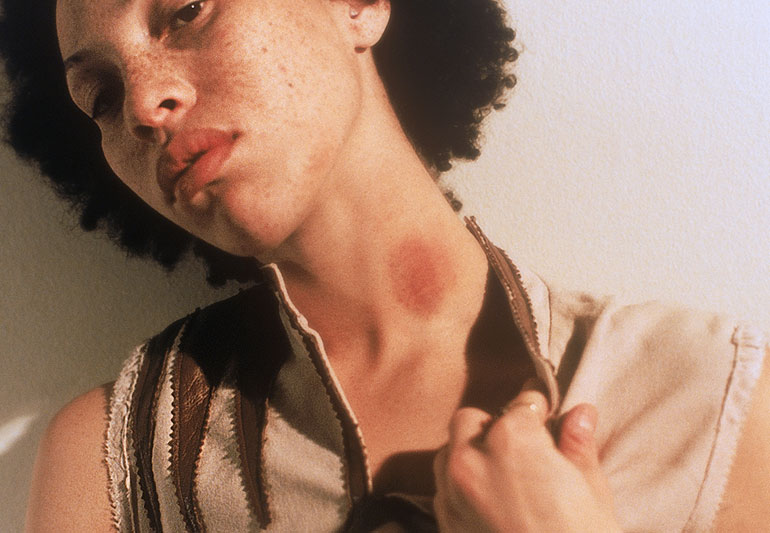

You got a little hot and heavy in the heat of the moment — and now there’s evidence of it for all to see, right there on neck.
A hickey is a bruise caused by trauma to the skin, such as by sucking or biting. And although they aren’t serious injuries, they can be pretty embarrassing! So how can you get rid of a hickey ASAP?
Dermatologist Alok Vij, MD, explains how to minimize a hickey while you wait for it to fully fade.
How long does a hickey take to heal?
The truth sucks (hickey pun intended): There’s no quick and easy way to get rid of a hickey. Like other forms of bruising, they need time to heal.
There’s good news, though. Most bruises last anywhere from three days to two weeks, and hickies, which are a superficial form of bruising, don’t take as long to heal as other types.
“The amount of trauma to the skin that creates a hickey isn’t as great as the trauma that causes, say, a black eye,” says Dr. Vij, “so hickies can heal earlier on the spectrum as compared to other causes of bruising.”
And while the internet is full of DIY tips that claim to get rid of a hickey overnight, Dr. Vij says there’s no real science to most of them. Instead, he shares his top tips for minimizing your hickey’s appearance as it heals.
Apply warm compresses to your hickey
Your best bet is to treat your hickey with good old-fashioned warm compresses.
“Warm compresses can help open up your body’s blood vessels and break down the stain, taking away the red blood cells that have spilled out from the blood vessels and into your skin,” Dr. Vij explains.
You can do the following method as many as four times a day throughout the duration of your hickey:
- Fill a microwavable bowl with water, and heat it in the microwave until it’s warm enough that you can just barely stand to keep a finger dipped into it. “It should be warmer than bathwater, but nowhere near boiling,” Dr. Vij says.
- Soak two clean washcloths in the bowl of water, then grab one and wring it out. Apply it to your hickey, letting it sit until the washcloth has come back down to room temperature. Then, return that washcloth to the bowl of water and wring out the other one, repeating the process with the second washcloth.
- Repeat the process three or four times, for a total of 15 to 20 minutes. You may have to reheat the bowl of water between applications as it cools.
And though cold compresses can help in cases of more substantial bruising, don’t bother putting them on your hickey. “The trauma to your skin is minimal enough that cold won’t do much good,” Dr. Vij says.
Instead, jump right to warm compresses and repeat as necessary for as many days as it takes the mark to fade.
What to put on a hickey
In addition to the warm compress method, you can apply the following gels or creams to your hickey to help speed the healing process:
- Arnica: Doctors aren’t sure exactly why, but arnica has been found to help bruises heal more quickly. Avoid it, though, if you take blood thinners.
- Vitamin C: Research suggests that vitamin C can help blood clot, which helps reduce the amount of bruising.
- Vitamin K: Though vitamin K may help fade bruises, apply it topically instead of taking it orally, as the oral form is associated with more potential risks.
Some sources suggest aloe vera, which can calm skin inflammation (as in the case of sunburns) — but Dr. Vij says it’s not actually much help on hickies. “With a hickey, there’s not that much skin inflammation,” he says. “It’s just slight trauma.”
How to hide a hickey while it heals?
If you have a big event coming up, you can ask your doctor about laser removal for a hickey in the 24 to 48 hours after it first appears. Beyond that, though, even lasering can’t help much, and you’ll just have to wait out the healing process.
With no real way to remove a hickey, your best bet is to keep it covered, whether by clothing or with light makeup. Time to stock up on scarves!
more recommended stories
 Red Blood Cells Improve Glucose Tolerance Under Hypoxia
Red Blood Cells Improve Glucose Tolerance Under HypoxiaKey Takeaways for Clinicians Chronic hypoxia.
 Pediatric Crohn’s Disease Microbial Signature Identified
Pediatric Crohn’s Disease Microbial Signature IdentifiedKey Points at a Glance NYU.
 High-Fat Diets Cause Damage to Metabolic Health
High-Fat Diets Cause Damage to Metabolic HealthKey Points Takeaways High-fat and ketogenic.
 Can Too Many Antioxidants Harm Future Offspring?
Can Too Many Antioxidants Harm Future Offspring?Key Takeaways High-dose antioxidant supplementation in.
 Human Antibody Drug Response Prediction Gets an Upgrade
Human Antibody Drug Response Prediction Gets an UpgradeKey Takeaways A new humanized antibody.
 Dietary Melatonin Linked to Depression Risk: New Study
Dietary Melatonin Linked to Depression Risk: New StudyKey Summary Cross-sectional analysis of 8,320.
 Type 2 Diabetes Risk Identified by Blood Metabolites
Type 2 Diabetes Risk Identified by Blood MetabolitesKey Takeaways (Quick Summary) Researchers identified.
 Microglia Neuroinflammation in Binge Drinking
Microglia Neuroinflammation in Binge DrinkingKey Takeaways (Quick Summary for HCPs).
 Durvalumab in Small Cell Lung Cancer: Survival vs Cost
Durvalumab in Small Cell Lung Cancer: Survival vs CostKey Points at a Glance Durvalumab.
 Rising Chagas Parasite Detected in Borderland Kissing Bugs
Rising Chagas Parasite Detected in Borderland Kissing BugsKey Takeaways (At a Glance) Infection.

Leave a Comment